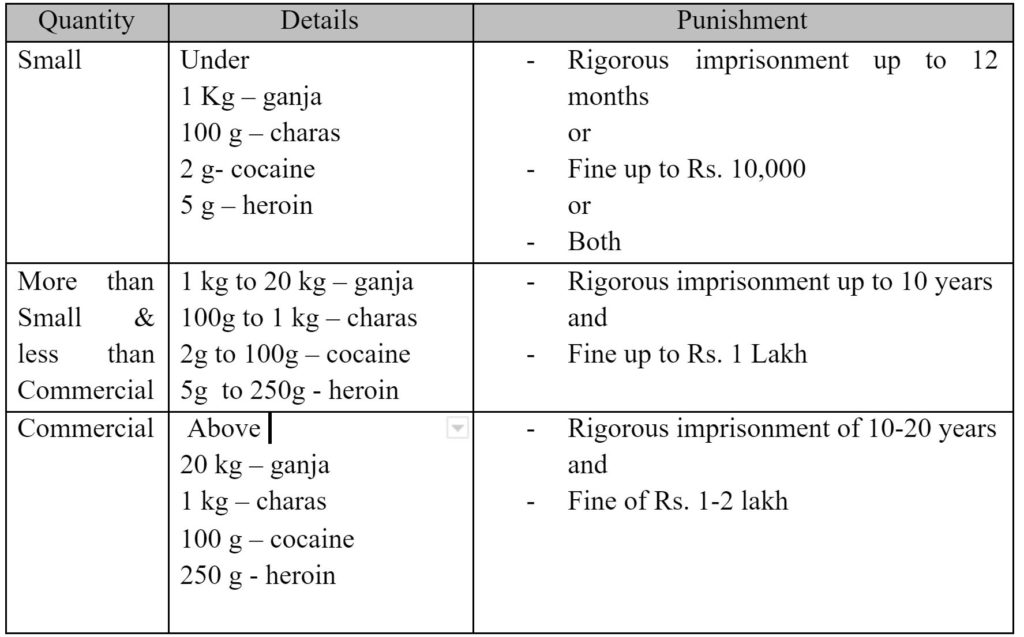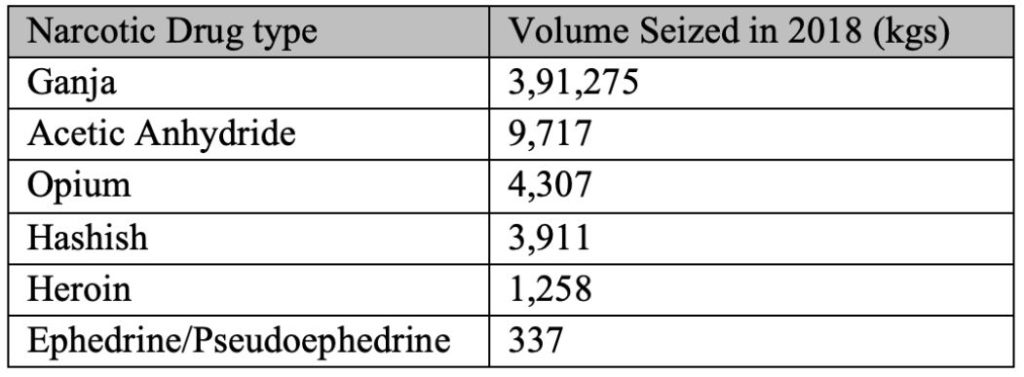As per the data released by the National Crime Records Bureau (NCRB) in its annual ‘Crime in India’ report, the number of cases booked under the NDPS act for possession of drugs for personal use & trafficking increased by over 25% in 2017 & 2018 compared to the earlier three years (2014 to 2016). Maharashtra & Punjab reported more than 10000 cases each in 2018.
In relation to the ongoing investigation into the alleged suicide of actor Sushant Singh Rajput, the Narcotics Control Bureau (NCB) has arrested few persons associated with the deceased actor, on the allegations of purchase and being in possession of prohibited drugs. The arrests were made under NDPS (Narcotic Drugs and Psychotropic Substances) Act, which makes trading, possession and consumption of narcotic drugs in India illegal and prescribes the necessary legal action in case of any offence.
In one of our earlier stories, we looked at suicides due to drug abuse/alcohol addiction in India. In this story, we take a look at NDPS Act, its provisions and the incidence of offences under this act.
‘NDPS Act 1985’ prohibits possession, distribution & consumption of Narcotic drugs
Prior to NDPS Act, the control and legality of narcotic drugs was exercised under the provision of The Opium Act, 1852, The Opium Act, 1878 and The Dangerous Drugs Act, 1930. However, in 1985, the government of the day felt that the prevailing legislation was inadequate to deal with the illicit drug trade and drug abuse at both national and international level. Therefore, a comprehensive new legislation was formulated and brought forth in the form of Narcotics Drugs and Psychotropic Substance Act, 1985 (NDPS Act, 1985).

There have been multiple amendments to the original act in 1988, 2001 and 2014.

The Act lists all the narcotics and other psychotropic substances which are considered as illegal. These includes various extracts from Cannabis plant (charas- resin, Ganja – fruiting/flowering tops), Coco extracts (cocaine), opium, poppy stalk and other manufactured drugs which are psychotropic in nature.
The act also prohibits the cultivation of coca, opium poppy or any cannabis plant. It further prohibits the production, manufacturing, possession, selling, purchase, transport, storage or consumption of any narcotic drug or psychotropic substance. The act restricts the interstate import & export along with import & export of these substances into and outside of the country.

The Act further lays down the punishment for contravention of any of the provisions in the act. The severity in the punishment is based on the quantity of the drug involved.

35% increase in the number of cases registered annually under NDPS Act
The National Crime Records Bureau’s (NCRB) annual Crime in India report provides information of the various crimes registered under IPC (Indian Penal Code) and SLL ( Special and Local Laws). Offences which are booked under NDPS Act fall under SLL, and the information related to these offences is provided in the annual Crime in India report. The latest report is for 2018, as per which 63,137 cases were booked under NDPS Act in 2018. This is slightly less compared to that of previous year, when 63,800 cases were booked under this act.
However, there is a sharp increase in the number of cases booked during 2017 & 2018 compared to that of the earlier three years i.e. 2014 to 2016.
In terms of crime rate, it went up to 4.8 cases per million population in 2018, compared to that of 3.8 per million population in 2014.
The report also states that in 2018, Ganja, Acetic Anhydride, Opium, Hashish, Heroin, etc. are the type of drugs whose highest volumes were seized.

Greater number of cases booked for Possession of Drugs for personal consumption
In the last two reports i.e. for 2017 and 2018, NCRB has categorized the total offences booked under NDPS Act into:
- Possession of drugs for Personal use/Consumption
- Possession of drugs for Trafficking
As per the information provided in the NCRB reports, in both the years, the number of cases booked due to possession of the drugs for personal consumption was higher than that of the possession of these drugs with the intent of trafficking or commercial purpose. However, while the number of cases booked for possession for purpose of personal consumption has reduced in 2018, it has increased in the case of possessing the drugs for trafficking.
Maharashtra & Punjab report the greatest cases, but increasing trend observed in many other states
In 2018, the greatest number of cases under NDPS Act was booked Maharashtra with more than 12 thousand cases. However, this is a sharp fall compared to the earlier years. In fact in 2015, there were nearly 19 thousand cases booked in Maharashtra i.e. more than 1/3rd of the total number of cases booked in the country during that year.
Punjab has the second greatest number of cases booked under this act with 11,654 cases in 2018. However, this is substantially more, in fact twice the number of cases booked in 2016 when only 5906 such cases were booked in the state.
As noted earlier in this article, the number of cases booked under NDPS act is relatively higher in 2017 & 2018 compared to earlier years, despite the fall in such cases from Maharashtra. This increase in the number of cases is fuelled by significant increase in other states, mostly U.P, Haryana, Tamil Nadu, Uttarakhand, Madhya Pradesh, Karnataka etc. Kerala, which witnessed a continuous increase in the number of cases over the years, has seen a slight dip in 2018.
The incidence rate is higher in Punjab across the years, followed by Kerala, Himachal Pradesh and Goa. In Punjab, around 39 cases are registered per million population in 2018, while in Kerala the rate is 24.9 per million. The U.T of Chandigarh, which is also the capital of Punjab has a higher incidence rate with 15.2 cases registered for million population.
In Maharashtra most cases booked because of personal consumption while in West Bengal it is for trafficking.
The categorization of the cases booked under NDPS by purpose of possession offers further insights into the nature of narcotic drug trade in the country.
- In Maharashtra, which has the highest number of cases booked under this act, an overwhelming 96% of the cases are booked for ‘Possession for Personal use/Consumption’. During 2017 & 2018, only around 4% of the cases were booked for possessing drugs for trafficking.
- Kerala also has a similar trend to Maharashtra where 93-94% of the cases booked during 2017 & 2018 were for possessing drugs for personal use.
- In the case of Punjab, the share was almost equal with around 51-52% of the cases are for possessing the drugs for personal use while the rest for possession for trafficking.
- In West Bengal, the numbers are skewed in terms of cases booked for possession of Drugs for the purpose of Trafficking. 88% of the cases in 2017 and 83% of the cases registered in 2018 under the NDPS were for possession for purpose of Trafficking. It has to be noted that a total of around 1500 cases are booked in West Bengal every year.
- Chhattisgarh also has a significant share of 92-94% cases being booked for possessing them for sake of trafficking.
- Uttarakhand had 83% of the cases booked for possession for purpose of trafficking in 2017, but in 2018, the number of cases under this category was only 33%.
- Rajasthan, Tamil Nadu, Uttar Pradesh, Madhya Pradesh etc. are among the other states with higher number of cases booked, where more than 50% of these cases are booked for possession for purpose of trafficking in 2018.
As per this data, it can be inferred that while Maharashtra, Kerala, Punjab, Bihar, Haryana etc. are higher on the demand side, the supply can be pinned to Chhattisgarh, West Bengal etc. among others.
In the next story, we take a look at the disposal of the cases under NDPS by the police as well as the courts , which is critical to ensure the effectiveness of the law in place.
Featured Image: Cases booked under NDPS act


